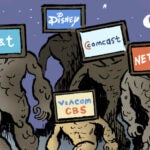There’s a storm cloud darkening Criteo’s sunny Q3 earnings (33% YoY growth ex-TAC to $234 million), in the form of Apple’s Intelligent Tracking Prevention (ITP) feature, which went into effect Sept. 19. [More AdExchanger coverage.]
ITP cost Criteo a little less than $1 million in Q3, but that number is expected to grow as iOS 11 adoption increases.
By Q4, Criteo predicts ITP adoption will cost the company a minimum of $20 million. That figure represents the 8% to 10% net negative impact predicted for Criteo’s base revenue projection for Q4, which is between $260 million and $263 million, the company said.
But Criteo says it’s developed a solution to help it recoup some of the losses from ITP.
“What we’ve developed is a privacy-friendly solution, which is reliant on a [non-cookie] identifier that allows the transfer of information between websites and our servers,” said Eric Eichmann, CEO of Criteo.
Criteo uses HTTP Strict Transport Security protocol, typically used to prevent cookie hijacking or to ensure secure web connections, to communicate browser information between third-party sites and its servers. For now, it bypasses Apple’s ITP protocols.
“There are ways for Apple to block this solution, but on any product we’ve produced, we’ve always followed privacy standards,” Eichmann told AdExchanger. “We allow customers to opt out of this solution through banners on a site the first time a user comes in.”
More broadly, without a viable way to track user actions on Safari, Eichmann predicts publisher revenue will go down and that retail advertisers won’t be able to compete as effectively against data-driven behemoths like Amazon.
“If you have people coming to your website and properties everyday like Amazon does, you can do whatever you want and you aren’t affected by what Apple does,” he said.
While Eichmann agrees advertising should give consumers a better experience, he disagrees with Apple’s approach.
“Cookies aren’t just being used for advertising,” he said. “It’s a way to transfer information, and they’re useful for other things [in the user experience]. This should be more about giving users better control [rather] than limiting what the ecosystem does, because the ecosystem has evolved into a place where consumers have gained free service as a result.”
Criteo pulls out of search
Criteo also revealed it would retire its search product, Predictive Search.
Eichmann entered the area knowing it would be challenging, given its maturity and Google’s dominance.
While companies like Marin had a 3%-5% margin, Criteo bet that it could be disruptive and pull a 10%-15% margin.
“But we could only do that if we provided demonstrable uplift for clients,” Eichmann said. “We realized the measurement of uplift in search was quite hard and volatile.”
While clients saw value in the cost reductions and revenue uplift Criteo provided, Google’s stranglehold on supply made the new search business difficult to maintain.
Criteo decided to devote its resources to commerce marketing, relying on products from its HookLogic acquisition and investing in its new offline-to-online commerce platform.















